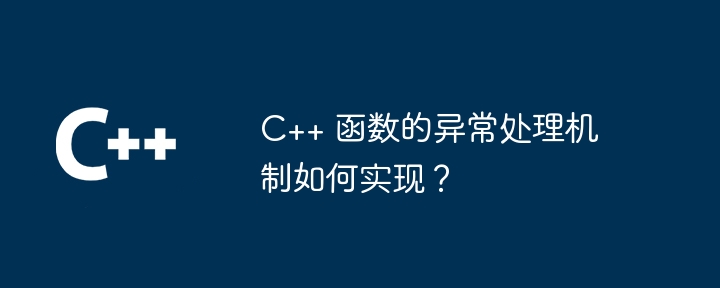
The exception handling mechanism in C is implemented through exception throwing, catching, and stack unwinding, allowing the program to handle errors or exceptions gracefully when they occur, avoiding program crashes. Specific implementation steps include: 1. Define the exception type; 2. Use the throw keyword to throw an exception; 3. Use try, catch, and finally blocks to capture and handle exceptions; 4. Find the appropriate handler in the call stack.

The exception handling mechanism is crucial in C, which allows the program to handle errors and exceptions gracefully. Avoid program crashes.
The essence of exception handling
Exception is a special object triggered by certain errors or exception conditions. When an exception is triggered, the program interrupts the current flow of execution and branches to a special function called an exception handler. The exception handler will handle the exception and possibly perform recovery operations.
Implementation of exception handling mechanism
The exception handling mechanism in C is implemented through the following steps:
std::exceptionbase class.throwkeyword to throw an exception object.throwThe expression can be an exception object, an exception type, or a literal.try,catchandfinallyblocks to catch and handle exceptions. Thetryblock contains code, thecatchblock handles different exception types, and thefinallyblock is executed in any case (regardless of whether an exception is thrown or not).Practical case
The following is an example of using the exception handling mechanism to handle file read errors:
#include#include int main() { try { std::ifstream file("data.txt"); if (!file.is_open()) { throw std::runtime_error("无法打开文件"); } // 其他文件读取操作 } catch (const std::runtime_error& e) { std::cerr << "错误: " << e.what() << '\n'; return 1; } catch (...) { std::cerr << "发生了未知的错误\n"; return 1; } }
The above is the detailed content of How to implement the exception handling mechanism of C++ functions?. For more information, please follow other related articles on the PHP Chinese website!
 What are the differences between c++ and c language
What are the differences between c++ and c language Recommended learning order for c++ and python
Recommended learning order for c++ and python Cost-effectiveness analysis of learning python and c++
Cost-effectiveness analysis of learning python and c++ Is c language the same as c++?
Is c language the same as c++? Which is better to learn first, c language or c++?
Which is better to learn first, c language or c++? The difference and connection between c language and c++
The difference and connection between c language and c++ C++ software Chinese change tutorial
C++ software Chinese change tutorial Cost-effectiveness analysis of learning python, java and c++
Cost-effectiveness analysis of learning python, java and c++



